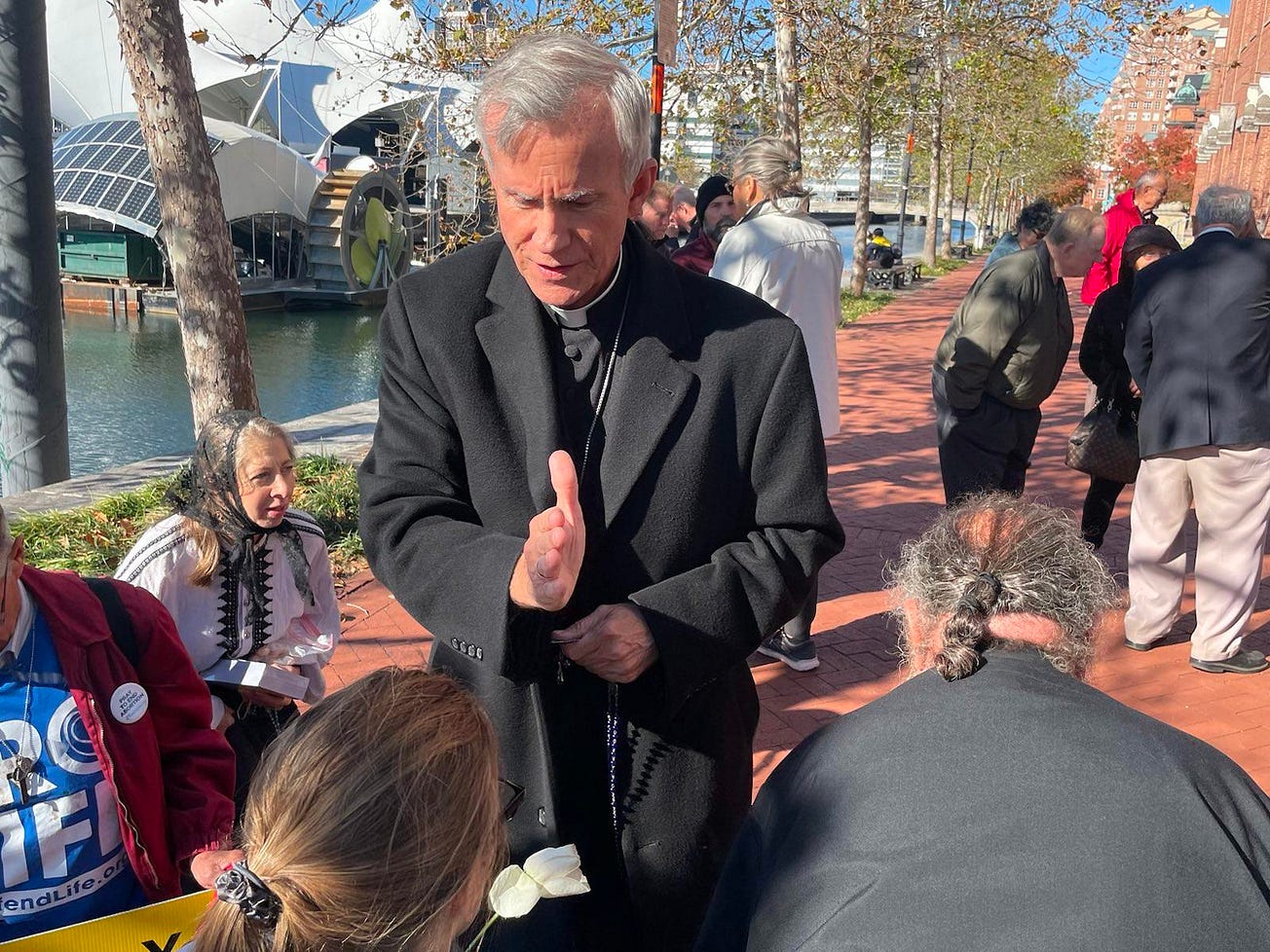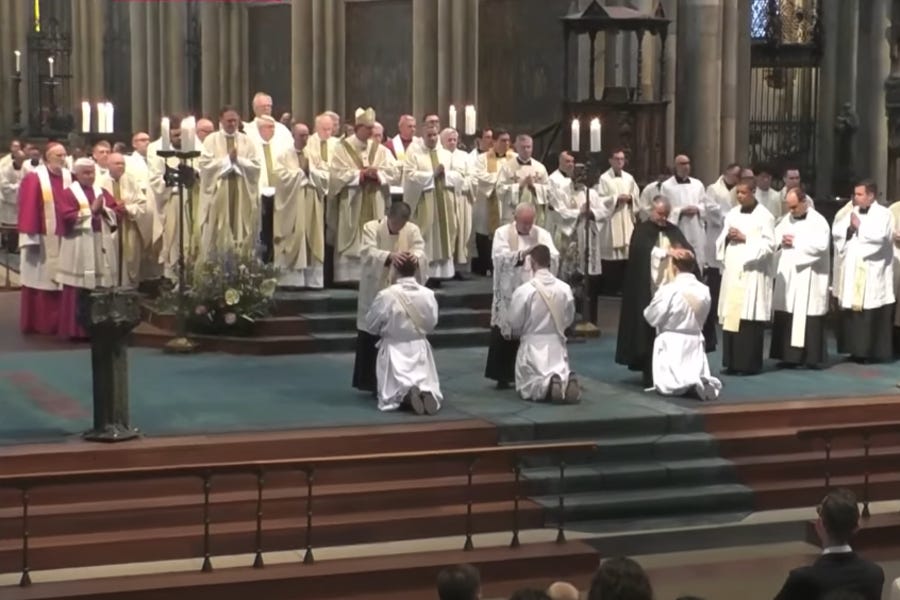A woman who says she was sexually assaulted by a priest is calling for the passage of a state law that would make it a crime for pastoral ministers to have sexual contact with spiritual directees and others to whom they provide “pastoral counseling.”
If passed, the New York state bill would ensure pastoral ministers are not able to use their knowledge, trust, and authority to manipulate or abuse their congregants, Dakota Bateman told The Pillar.
The role of a spiritual director is “similar to the role of a therapist,” Bateman explained, suggesting that religious ministers and psychologists or counselors should be treated similarly in law.
“If you are going to somebody and they know everything about you, they have the upper hand and they're put in this position of trust…it becomes so easy for that to be [abused]. It’s not necessarily an equal relationship — In my case, he knew everything about me. He knew I had been sexually assaulted previously. And he knew how to make me freak out, and how to make it harder to fight back.”
“So [the bill] just adds another level of protection. Because it is so important that those boundaries aren’t crossed — because there is so much trust, and you're in a position of authority, so asking questions about consent in a situation like that just doesn’t even make sense. What’s consent in that situation?”
New York Senate Bill S5745 was introduced in the state’s senate more than a year ago, in March 2021.
The bill would establish “that a person is legally incapable of consenting to sexual
conduct when they are a member or adherent of a church or religious group and the actor is a member of the clergy or minister providing the person with pastoral counseling services.”
At least 13 U.S. states and the District of Columbia make it a crime for pastoral ministers to engage in sexual conduct with their spiritual directees or others who recieve from them pastoral counseling.
New York is not one of them.
But Bateman says her bill is important.
“It would give other people the chance to have justice, where I didn’t, because there was no law like this,” she told The Pillar.
State Senator Brad Hoylman introduced the bill into New York’s state legislature after he was contacted by Bateman, who shared with him that she had been sexually assaulted by a priest in 2018.
Holyman’s spokesperson told The Pillar that the lawmaker was “humbled” that Bateman “was willing to share her story with him.”
By email, the senator said he’s sponsoring the bill because “people rely on their religious leaders for refuge and guidance. Your relationship with your religious or spiritual leader is based in trust and a deep connection unlike any other. Religious leaders are in positions of authoritative influence within their communities.”
“The state prohibits sexual relations with your therapist, teacher, or boss — even if both parties are consenting adults. Your relationship with your religious leader should be no different,” Hoylman added.
But more than a year after it was formally introduced, the bill has made no movement in the legislature. It was assigned to a senate committee in March 2021, but has not been scheduled for a hearing.
Hoylman told The Pillar that he hopes the bill will gain traction.
“It was just introduced last year, so we're still having discussions with our colleagues about the issue, educating them about the need for this bill, and soliciting input from stakeholders,” the senator said by email.
Among those stakeholders is the New York State Catholic Conference, which lobbies in Albany on behalf of New York state’s eight dioceses.
Dennis Poust is executive director of the state conference.
He told The Pillar that his office has “reviewed but haven’t taken a position on S5745, because we generally don’t take positions on legislation until it is put on a committee agenda. There are literally thousands of bills introduced every year and many never move beyond the intro stage.”
But, Poust added, “it is likely we would support the bill were it to move in committee.”
“When a member of the clergy engages in a sexual or sexually charged affair with someone who is directly in his spiritual care, there is an undeniable power imbalance and it is a grave abuse of power and trust, similar to a therapist or physician,” Poust told The Pillar.
While the Church has continued to address aspects of clerical sexual misconduct in recent years, experts have called recently for Church authorities to take a more serious look at addressing the implications of priests who have sexual contact with adults, when the canonical process for resolving allegations can be less clear.
Moral theologian Fr. Thomas Berg wrote in The Pillar this month that “the Church still has a very serious problem with priests who are sexually active with adults. Many of these relationships are precipitated in part by the power differential that exists between clergy and laity. To that extent, these relationships cannot be understood as simply consensual; many of them actually constitute instances of abuse.”
Bateman told The Pillar that she experienced that power imbalance when she was assaulted by a priest, her spiritual director, in 2018.
She alleges that the priest, Fr. Benedict Jurchak, manipulated her, used his knowledge of past abuse, her insecurities, her spiritual struggles - used the intimacy of their pastoral relationship - to impose himself on her, get close to her, and eventually assault her sexually, several times, during a visit to her New York state home.
“If there had been a law like this, then when I made police reports, there would have been something to charge him with. The question for the police wouldn’t be about whether they could prove that what happened wasn’t consensual — because something like this violates boundaries…because a relationship like this isn’t equal to start off with.”
Bateman met Jurchak - the priest she says later assaulted her - when she was a student at Franciscan University of Steubenville. The priest was a Third Order Regular Franciscan friar, in campus ministry at the university, and he soon became her confessor, and then her spiritual director. She talked with Jurchak about instances of sexual assault in her past, she told The Pillar — and she trusted him.
After she graduated, Bateman says she kept in touch with Jurchak. She said they were close. And she told The Pillar that when she was sexually assaulted at the juvenille detention center where she worked, Jurchak was the first person she told.
Bateman says that in February 2018, the priest visited her home in New York.
“That was when the assault happened,” she told The Pillar.
During a visit of several days, Bateman alleged, the priest repeatedly kissed her, and eventually groped at her breasts under her clothing, and at her genitals over her clothing, despite her objections and efforts to stop the situation.
Bateman told The Pillar that she recalls a particular moment of feeling defeated — she says in that moment, she pushed Jurchak away as he groped her, and he grabbed at her again - under her clothing - despite her efforts.
“I felt defeated,” she said, because “I actually tried to assert myself for once and it didn’t matter.”
“Every other time I was assaulted, I froze,” she remembered, “so I was actually proud of myself for being assertive, which made it all the more defeating” when Jurchak didn’t stop, she said.
Jurchak would apologize after each act of kissing or non-consensual touch, Bateman alleged.
Bateman says it took her a few months to report the assault to the priest’s Franciscan province.
“I decided to contact the order and let them know,” what had happened.
In June 2018, she emailed Jurchak’s provincial superior, Fr. Richard Davis.
In September, she spoke on the phone with Davis. Bateman said she reported that the priest “had put his hand up my shirt and I had pushed it away. I was clear that it wasn’t something that I wanted.”
She told The Pillar that she reported what had happened because she was concerned for Jurchak, and for anyone else who might be harmed by him.
“I felt like I needed to make sure that he was actually getting help and he was not going to hurt somebody else,” she recalled. Bateman told The Pillar that she was concerned about the priest’s mental health, and hoped that mental health care might ensure that the priest would not commit another act of sexual misconduct.
“At that point I wasn’t using the word ‘assault,’ but I think I was clear then that it wasn’t something that I wanted.”
“But nothing happened.”
Bateman alleges that the priest’s provincial superior “kind of blew me off over the phone.”
“And then he sent me an email saying that he had spoken with Fr. Benedict, and that Fr. Benedict was doing fine in his programs, and that there was no need for me to have further contact.”
Bateman told The Pillar that in September 2018, she reported the alleged assault to her home diocese; she contacted the victims’ assistance coordinator in the Diocese of Syracuse, New York, who filed a report in February 2019.
The next month, she spoke again to Jurchak’s provincial superior, by now Fr. Malachi Van Tassell, identifying the alleged misconduct directly as an assault.
According to the canonical investigation, Van Tassell spoke with Jurchak, who “acknowledged that, while on a visit to see his grandmother, he had visited Ms. Bateman in her home, at her invitation. He reported that she ‘came on to him’ during that visit and had previously engaged in other attention-seeking behavior from him. According to Father Jurchak, he had terminated spiritual direction with her in February 2018 as a result of this behavior on her part, but she continued to pursue contact. Eventually, he had to block her on social media.”
“Consequently, the Minister Provincial concluded that no further action was warranted,” the canonist’s report explained.
In June 2019, Bateman contacted the Syracuse police, who told her that her case did not meet the standard for criminal prosecution. Bateman told The Pillar that the police report was riddled with error, light on detail, and did not give the impression that Bateman had been taken seriously.
That, she told The Pillar, is part of the reason why a bill that criminalizes sexual contact between clerics and their spiritual directees is so important — because it would make clear that a category of sexual contact is, by definition, illegal, and lower a standard of proof that might otherwise get bogged down into a “he said-she said.”
Jurchak, according to the Franciscan province, was temporarily removed from ministry in 2019, and in August of that year, the province contacted a civil investigator to review Bateman’s allegations against Jurchak. The investigator found that Bateman’s assault allegations were “not substantiated by the evidence and are deemed not credible,” according to a subsequent report.
Bateman said the civil investigator never interviewed her. “I emailed him a few times, but I never heard back,” she told The Pillar.
Without an interview, the investigator found that Bateman’s assault allegations were “not substantiated by the evidence and are deemed not credible,” according to a canon lawyer who was later contracted by the Franciscan province to evaluate the situation.
Despite Bateman’s allegations and the priest’s admission of some unspecified misconduct, a formal canonical investigation was apparently not conducted by the province before Jurchak was assigned as a parochial vicar at Our Lady of Victory Parish in State College, Pennsylvania, in August 2020.
But after Bateman contacted the Diocese of Altoona-Johnstown, Pennsylvania the next month, the priest was removed from parish ministry in that diocese, according to emails reviewed by The Pillar.
Bateman says that after pressure from the Altoona-Johnstown diocese, a canon lawyer was contracted by Jurchak’s religious superiors to conduct a canonical process called a preliminary investigation.
In a December 2020 report obtained by The Pillar, the canonist wrote that the priest “does not seem to dispute that he spent time alone with Ms. Bateman in her home over the course of several days.”
Jurchak “acknowledges that a boundary violation of some sort occurred and texted Ms. Bateman to apologize for being ‘gross,’” she added.
But while the canon lawyer’s report did not question Bateman’s account, it found that “the allegation of forced sexual contact is unsubstantiated,” because “there is only one complainant regarding incidents that occurred when she and Father Jurchak were alone, there is no way to corroborate her allegations.”
Nevertheless, the canonist did not question the credibility of Bateman’s report:
“For my part, I would note that ‘unsubstantiated’ and ‘not credible’ are two markedly different things,” the canonist emphasized.
The canon lawyer observed that Jurchak acknowledged a “boundary violation… despite the fact—and one could reasonably argue, perhaps because of the fact—that he was well aware of Ms. Bateman’s vulnerabilities around healthy boundaries and her fears of being rejected/abandoned.”
The report also recommended the province impose a “penal precept,” akin to a formal warning, “that, if such conduct is ever repeated, a formal penalty (such as suspension) may be imposed.”
The canon lawyer also expressed serious concern with “Father Jurchak’s apparent obliviousness to the fact that he is in a situation of his own making, as well as his initial denials of any misconduct.”
“Obviously, had he maintained an appropriate, exclusively-ministerial relationship with Ms. Bateman, we would not be at this juncture. Moreover, had he been forthcoming from the start, it is unlikely Ms. Bateman would be seeking redress more than two years after her initial report. Consequently, if anyone’s credibility is to be doubted, it would be Father Jurchak’s,” the canonist wrote.
In light of “well-documented harm done to Ms. Bateman by her interaction with Father Jurchak,” the canonist urged the Franciscan province “to assist [Bateman] with the costs of both past and future mental health treatment.”
The province did initially compensate Bateman for counseling sessions, she told The Pillar, but eventually stopped doing so.
And in August 2021, Jurchak began ministry as a chaplain in a veterans’ retirement home in the Archdiocese of Washington, with his priestly ministry restricted to that setting.
But in recent months, Bateman began posting her allegations online, attracting attention from Catholics on social media, and alleging that the Franciscan province hadn’t taken her concerns seriously. And in April the Archdiocese of Washington withdrew its permission for the priest to engage in that ministry.
“On April 29, 2022, Father Benedict Jurchak, TOR, was removed from ministry by the Archdiocese of Washington, where he had been ministering as a chaplain in a veterans’ retirement home,” the Sacred Heart province said in a May 3 statement.
The statement said that Jurchak had been investigated and temporarily removed from ministry “when a single allegation of sexual misconduct involving an adult woman was reported to the Franciscans. In the following years, both the police and an independent lay investigator reviewed the claim and found that it could not be substantiated. A female lay canonist also conducted an investigation in accord with canon law and made the same finding, which was accepted by the Franciscans after consultation with a lay review board.”
“While the Franciscans disclosed all this to the Archdiocese of Washington prior to Father Benedict’s assignment there, the recent public attention given once again to this single unsubstantiated allegation has made it impossible, from the perspective of the archdiocese, for him to minister there.”
The province declined requests for comment from The Pillar, and pointed to its May 3 statement. Jurchak could not be reached for comment.
While the canonist reviewing the case recommended a penal precept for Jurchak, Bateman told The Pillar she does not believe the priest should be in ministry, especially because she does not think the province has taken her allegations of spiritual manipulation seriously.
She charges that the priest exploited her vulnerability, and charges that Jurchak admits to conduct that would be considered unethical in other professional relationships.
“My therapist would never come to my house to hang out,” she told The Pillar. “It’s different obviously to visit a family who are parishioners or friends, but I’m a young, single girl. And you would think a priest would just know not to put himself or anyone else in that position.”
“But especially to use a spiritual relationship, where you know someone’s wounds, and then you’re using them to manipulate them — there has to be a stop to that. And we need to understand that the difference between ‘consensual’ and ‘non-consensual’ is not the same when he’s your spiritual director, any more than if he was your therapist or someone else in a trusted relationship.”
Advocates for victims of sexual abuse say that stories like Bateman’s are often insufficiently handled in the Church.
Sara Larson, executive director of the advocacy group Awake Milwaukee, wrote in The Pillar this month that within Church policies, “greater clarity is needed about situations in which an adult can be vulnerable to sexual abuse and how these reports should be handled in the Church. As it stands today, I hear over and over from survivors of adult abuse that their reports were ignored, dismissed, or covered up by their diocese, even if a priest abused them while serving as their spiritual director, confessor, counselor, or supervisor.”
“I am blessed to walk closely with many abuse survivors, including those who have been devastated by clergy sexual abuse that took place during adulthood. The Church seems to be moving slowly in the direction of recognizing the gravity of this harm,” Larson added.
However the Church’s law moves on that question, Bateman says she hopes the NY bill will raise attention to the problem of abusive dynamics in spiritual relationships, and provide recourse for others who have been hurt.
“This bill wouldn’t do anything for me, because laws don’t cover the past like that. But if they would protect someone else from being hurt in a spiritual relationship where they trusted the person — at least something would come out of what happened to me.”




